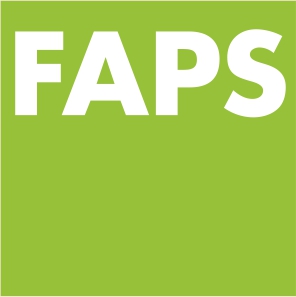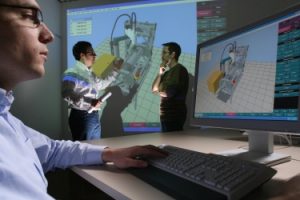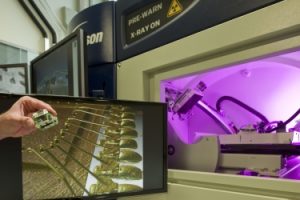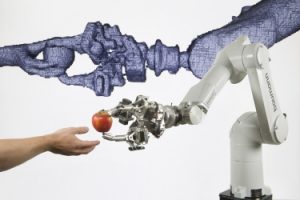Initial Situation:
To manage knowledge, wikis have become the most common tool in recent years. To turn the popular MediaWiki into a powerful and flexible knowledge management system, the Semantic MediaWiki extension was introduced, which adds semantic annotations to wiki pages describing the meaning of the content. These annotations enable computers to understand the meaning of the content on the wiki, which in turn enables the wiki to become a collaborative knowledge base. For industrial companies that design production plants, a Semantic Wiki offers the potential to reduce planning efforts by storing and providing existing expert knowledge about existing manufacturing processes and their properties. For example, a particular wiki page might describe a joining process such as laser welding (subject), whose properties indicate its suitability for different materials, joining geometries, or quantity requirements (objects). All this information is encoded as triples in RDF format, which can be queried and manipulated using SPARQL, a semantic query language.
With the advent of ChatGPT, the question arises whether such large language models (LLM) can improve the interaction with corporate Semantic MediaWikis. Instead of writing complex SPARQL queries or using the default Semantic MediaWiki search, the user could retrieve the stored knowledge via natural language queries while also benefiting from the advanced reasoning capabilities of a ChatGPT. In the case of production system design, the human manufacturing planner could simply ask the following question: Which joining process is suitable for joining the wire ends of an inner-slotted needle-wound stator for high quantities produced? Although the pure ChatGPT certainly has an answer to this, the existing facts in the company’s internal knowledge database are usually more valid and should therefore be used primarily. Since not all corporate knowledge is stored in a semi-structured wiki with underlying RDF store, there is also the question of whether LLMs can be used to facilitate the rather laborious extraction and formalization of knowledge (e.g., from internal text documents) in order to enrich the Semantic Wiki with further knowledge. Thus, the potential use cases of LLMs on corporate, domain-specific knowledge bases appear to be manifold, but have not been systematically researched so far.
Open-source projects like LangChain already show that it is possible to connect ChatGPT to an own, custom database, e.g., by bringing context into the input prompt, also known as in-context learning. Another approach is to fine-tune the LLM on a custom dataset. Besides, there are first approaches to use LLMs to generate SPARQL requests or an RDF rendition of a given text to automate the formalization of knowledge. So the technical possibilities are increasingly given and are currently expanding all the time. Now it is a matter of deriving domain-specific, beneficial applications from them.
Task:
In this AI project, you will investigate how LLMs such as ChatGPT or Llama 2 could be applied to enhance user interaction and knowledge extraction from corporate, domain-specific knowledge bases such as wikis or documents. For practical experimentation, the institute’s Semantic MediaWiki and a huge collection of documents, which contain rich knowledge about the production of electric motors, can be used. As the developments around LLMs are currently very dynamic, the introduction of own ideas is encouraged, of course.
Roughly, the project is structured as follows:
- Familiarization with the relevant basics of LLMs (e.g., ChatGPT 4 or 3.5, Llama 2), Semantic MediaWiki (RDF, SPARQL, etc.) as well as the considered application domain
- Identification of recent approaches to applying LLMs to custom data or knowledge bases
- Practical implementation of a selected, promising use case for applying LLMs to domain-specific knowledge bases such as the institute’s Semantic MediaWiki on electric motor production
- Discussion of the results and derivation of further research opportunities
Requirements and Application:
- High IT affinity required, ideally prior knowledge of relevant AI methods; initial familiarization with e.g. suitable online courses or books
- Access to the relevant data and knowledge bases as well as sufficient computing capacity via remote, i.e., working from home office possible
- Applications via email incl. resume and transcripts to andreas.mayr@faps.fau.de
Contact:
Excerpt to Further Reading:
- Mountantonakis, M., & Tzitzikas, Y. (2023). Using Multiple RDF Knowledge Graphs for Enriching ChatGPT Responses. arXiv preprint arXiv:2304.05774.
- Omar, R., Mangukiya, O., Kalnis, P., & Mansour, E. (2023). Chatgpt versus traditional question answering for knowledge graphs: Current status and future directions towards knowledge graph chatbots. arXiv preprint arXiv:2302.06466.
- Mayr, A., Dietze, S., Herzog, T., Schäffer, E., Schäfer, F., Bauer, J., … & Franke, J. (2019, December). Knowledge-based Support of the Production System Design by Semantic Technologies Using the Example of the Electric Motor Production. In 2019 9th International Electric Drives Production Conference (EDPC) (pp. 1-6). IEEE.
- Krötzsch, M., Vrandečić, D., & Völkel, M. (2006). Semantic mediawiki. In The Semantic Web-ISWC 2006: 5th International Semantic Web Conference, ISWC 2006, Athens, GA, USA, November 5-9, 2006. Proceedings 5 (pp. 935-942). Springer Berlin Heidelberg.
- https://python.langchain.com/en/latest/index.html
- https://gpt-index.readthedocs.io/en/latest/
- https://chat.lmsys.org/







